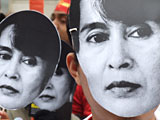US Disengages from Burma
By Simon Roughneen for ISN
The move marks an about-turn on Washington’s Burma policy, which had, for a few months at least, been predicated on the hope that the junta would defy all historic precedent and respond to foreign coaxing.
The first move came from Burma in February 2009, according to US officials. Afterwards, months were spent in Washington devising a new policy on Burma, which when announced, did not change that much in practice, as it retained sanctions. However, the US suggested that these measures could be relaxed, pending reforms in Burma.
To this end, Barack Obama became the first US president to meet with a representative of the Burmese government when he sat four seats away from the junta prime minister in Singapore in November 2009 at the inaugural US-Association of Southeast Asian Nations (ASEAN) summit.
However, the overtures were rebuffed or ignored, leaving the Americans looking somewhat naive as they were strung along by Burma's military dictator, Senior-General Than Shwe. In what might have been a final straw for the US, the junta last week announced a 7 November date for the country's first election in 20 years, but it has ignored appeals to release opposition leader Aung San Suu Kyi and more than 2,100 other political prisoners. The electoral laws were criticized for their restrictive nature, prompting Suu Kyi to boycott the polls.
The junta front party known as the Union Solidarity and Development Party (USDP) benefits from state resources, and is thought likely to win easily - similar to the last elections in 1990 when the military party was deemed a shoe-in, only to be resoundingly beaten by Suu Kyi's National League for Democracy, a result which the junta promptly ignored.
This time around it is thought that the military leaders will not take their eye off the ball. The 7 November date comes a week before Suu Kyi's house arrest is up, meaning that she will be locked up at home when the election takes place.
Burmese exiles and opposition groups let it be known that they were skeptical about the US overtures to the junta, which other ASEAN member-states spun as vindication of their own long-standing but fruitless 'engagement' with the Burmese rulers, which garnered plenty of lucrative natural resource contracts but little in the way of democratic reform.
The reality is that the US was and is seeking to curb China's growing influence around Southeast Asia, and that Burma is a minor part of this bigger issue.
Despite Burma being a source for hundreds of thousands of refugees and millions of migrant workers - many illegal - fleeing economic stagnation and repression at home, neighboring countries appear to be happy with the status quo. Allegations that the Burmese junta is working with North Korea on a nuclear weapons program and is in breach of UN Security Council resolutions against Pyongyang doubtless contributed to the US decision to back the inquiry.
However, despite the security implications for neighbors such as Thailand, there seems to be little apparent concern in or pressure coming from Southeast Asian capitals, aside from occasional exasperated-sounding remarks from the foreign ministries in Jakarta and Manila.
If the war crimes probe goes ahead, it will likely come after a UN General Assembly resolution later this year. The matter can then be referred to the UN Security Council, where as things stand, China and Russia would likely oppose the motion. But if the US is seriously backing the commission, then the first stop is possibly for a resolution to be introduced at the UN Human Rights Council in Geneva, where Thailand currently holds the rotating presidency, in September when that body next convenes.
The US is likely now to seek broader support for the commission, so far backed by Australia, the Czech Republic, Slovakia and the UK. The first port of call is likely to be Ottawa, followed by various EU capitals, to seek a common EU position on the commission of inquiry. The latter may prove difficult, as European countries differ on their position vis-a-vis the junta.
Less-tangibly, it is unclear how this latest US move fits in with recent assertiveness with junta ally China, with Washington forging new links with countries such as Vietnam, Cambodia and Indonesia to hedge against the surging economic power of Beijing. Earlier, at the start of his administration, President Obama pledged an open hand to 'rogue' states and erstwhile enemies. Whether or not the Burma about-turn presages similar moves elsewhere remains to be seen.

